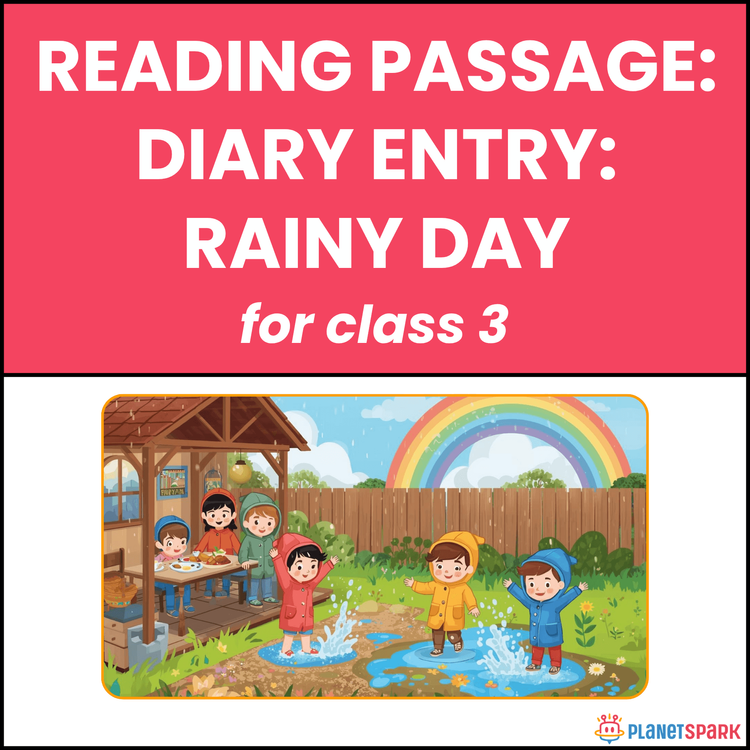Diary Writing for Kids – Diary Entry Format, Examples & Easy Tips

Table of Contents
- What is a Diary Entry?
- Diary Entry Format
- Sample Diary Entry for Kids (Ages 5–6)
- Sample Diary Entry for Kids (Ages 7–8)
- Sample Diary Entry for Kids (Ages 9–10)
- Sample Diary Entry for Kids (Ages 11–12)
- Sample Diary Entry for (Ages 13+)
- Types of Diary Entries Kids Can Write
- Diary Entry Writing Prompts
- Creative Writing Tips for Diary Entries
- Why Should Kids Write Diary Entries?
- How PlanetSpark Helps Kids Become Confident Diary Writers
- Conclusion
- FAQs: Diary Entry for Kids
Diary writing is one of the most personal, expressive, and confidence-boosting activities a child can indulge in.
In this blog post, we will explore everything kids need to know about diary writing format, what it is, how to structure it, examples, and tips for creativity. Plus, discover how PlanetSpark’s Creative Writing Course makes diary writing even more exciting with storytelling prompts, feedback, and publishing opportunities.
What is a Diary Entry?
A diary entry is a personal record of thoughts, feelings, and experiences, usually written in the first person and dated. It's like having a private conversation with yourself or a trusted friend on paper. The tone is often informal and honest, allowing you to express emotions freely.
There's no need for perfect grammar just genuine expression. Over time, diary entries help build self-awareness, creativity, and writing confidence.

Diary Entry Format
Understanding the diary writing format is the first step in helping children express themselves clearly and confidently. A well-structured format not only improves writing skills but also helps kids organize their thoughts meaningfully. Here's a simple and effective diary writing format that young learners can easily follow:
Step 1: Date
Begin your diary entry by writing the date at the top of the page. This helps track your thoughts and events over time. For example: August 4, 2025. It’s like a time stamp that tells you when the memory happened.
Step 2: Salutation
Start with a friendly opening like “Dear Diary”, or personalize it with fun names like “Hello My Secret Notebook” or “Dear Me.” This sets the tone for a casual and personal conversation.
Step 3: Body
This is the main part of your entry. Use paragraphs to describe what happened during your day, how you felt, and any thoughts or reflections you want to share. Kids can write about school, a fun activity, a worry, or even an imaginary adventure! Use expressive language, sensory details, and emotions.
Step 4: Closing
End your diary with a short closing line, such as “Goodnight,” “See you tomorrow,” or “That’s all for now!” It helps wrap up the entry in a natural, friendly way.
Step 5: Signature
Finally, add your name, initials, or a nickname (optional). Some kids enjoy signing off with a fun alias like “The Secret Thinker” or “Explorer Mia.”
This diary writing format gives children a clear path to follow while still leaving room for creativity and self-expression. As they grow more confident, they can customize the structure to suit their own unique style.
Sample Diary Entry for Kids (Ages 5–6)
Focus: Simple sentences, basic emotions, short events.
August 4, 2025
Dear Diary,
I played with my toy train today. It went choo-choo all around the room. Then I made a tall tower with blocks, but it fell down. I laughed a lot! I ate yummy noodles for lunch.Bye-bye!
(Name)
Whether it’s diary entries or storybooks, PlanetSpark makes creative writing exciting, structured, and rewarding.
Claim your free creative writing trial class now!
Sample Diary Entry for Kids (Ages 7–8)
Focus: Sequencing events, adding feelings, learning reflection.
August 4, 2025
Dear Diary,
Today was my art class. We painted animals. I made a big green turtle! My teacher said it was very creative. After that, I played football in the garden. I fell down once, but it didn’t hurt. I had a fun day!Goodnight!
(Name)
Sample Diary Entry for Kids (Ages 9–10)
Focus: Clear paragraphs, more emotion, beginning of introspection.
August 4, 2025
Dear Diary,
We had a spelling test in school today. I was nervous because I forgot to study two words. But when the test started, I remembered everything and got all the words right! I felt so proud. My teacher gave me a star on my notebook. I'm going to study more next time too.See you tomorrow!
(Name)
Sample Diary Entry for Kids (Ages 11–12)
Focus: Self-reflection, personal growth, descriptive language.
August 4, 2025
Dear Diary,
I felt really disappointed today. I practiced all week for the singing competition, but my voice cracked on stage. Everyone clapped, but I knew it wasn't my best. Still, I'm glad I didn’t stop singing. My mom said it takes courage to perform. I’ll try again next time and do better.Till then, keep my secrets safe.
(Name)
Sample Diary Entry for (Ages 13+)
Focus: Deeper emotional exploration, identity, future thinking.
August 4, 2025
Dear Diary,
Life is starting to feel a bit more complicated. Sometimes I want to talk to someone, but I don’t know who to trust. Today, my best friend ignored me during lunch. Maybe it was just a misunderstanding. I wish people said how they feel instead of pretending. Writing this down helps me think clearer. Maybe tomorrow I’ll talk to her.Thanks for listening.
(Name)
Types of Diary Entries Kids Can Write
Diary entries are not limited to “what I did today.” Kids can try various formats:
Reflective Entry: Thoughts about a life event.
Imaginative Entry: Write as if you're a cat, a pirate, or even the moon!
Letter Entry: A diary written as a letter to a friend or future self.
Goal Tracker: Documenting progress on a skill or habit.
Dream Journal: Recalling and reflecting on dreams.
Mood Diary: Daily emotional check-in with reasons.
Creative Writing is More Than Just Stories!
Through diary entries, poems, letters, and more, PlanetSpark helps your child explore every corner of their imagination.
Don’t miss the free creative writing session. Book now!
Diary Entry Writing Prompts
Use these fun prompts to get started:
Describe the happiest moment of your week.
Write about a dream you had last night.
Imagine you met a talking animal what would you do?
What would your diary say if it could talk back?
What did you learn about yourself today?
A time you felt really brave.
PlanetSpark offers many such prompts during live classes, stimulating fresh thoughts and stories.
Creative Writing Tips for Diary Entries
Writing in a diary should never feel like homework it’s your child’s personal space to be free, creative, and honest. But sometimes, entries can become repetitive like “I went to school” or “I had fun.” To make diary writing more exciting and expressive, here are some creative writing tips for kids tha can be followed:
1. Use “Show, Don’t Tell”
Instead of simply telling how you felt, show your feelings through actions, expressions, or surroundings.
Boring: I was sad.
Creative: Tears rolled down my cheeks as I hugged my teddy tightly.
This method makes diary entries more vivid and helps the reader (even if it's just you!) feel what you felt.
2. Add Dialogue
Including conversations can make your writing come alive. It’s like replaying a scene in your head.
Example:
"Mom said, ‘Let’s surprise Grandpa with a cake!’ I jumped with joy and ran to the kitchen."
Dialogue helps make your diary more personal and gives characters like friends or family a voice in your story.
3. Include the Five Senses
Don’t just describe what happened describe how it felt, smelled, sounded, looked, and tasted!
Ask yourself:
What did I hear? (Was it noisy or peaceful?)
What did I see? (Were the lights bright or the clouds grey?)
What did I smell? (Freshly baked cookies or rain-soaked mud?)
What did I touch? (Was it soft, rough, cold?)
What did I taste? (Sweet, sour, delicious?)
Example:
The soft scent of lavender filled the air as I opened the old book. Its pages crackled like whispers from the past.
Your Child’s Daily Journal Can Be a Masterpiece!
Enroll in PlanetSpark’s Creative Writing Course and build not just writing skills, but a voice.
Get started with a free demo class today.
4. Ask Questions
Asking questions in your diary helps you reflect and imagine. It adds depth and shows your curiosity.
Examples:
“I wonder if the stars can see me too.”
“Why do I feel nervous even when I know I’ve practiced enough?”
“Will I always remember this day?”
These questions make your entries more thoughtful and relatable and sometimes, your diary becomes the perfect place to explore the answers.
5. Use Imaginative Language
Add a splash of magic to your writing with similes, metaphors, and personification.
Instead of: It rained a lot,
Try: The rain danced on my window like a soft lullaby.
Instead of: I was excited,
Try: My heart raced like a drum as I opened the gift.
Imaginative language turns everyday moments into powerful scenes and helps young writers enjoy their own storytelling.
Bonus Tip: Give Your Diary a Personality
Some kids like to name their diaries or imagine they’re writing to a best friend or a future version of themselves. This makes writing more engaging and meaningful.
Example Openings:
Dear Sparkle (my secret diary), you won’t believe what happened today…
To my future self: Remember this moment it was magical!
Why Should Kids Write Diary Entries?
Diary writing is not just for fun it has many benefits:
Boosts Creativity: Kids learn to express their feelings and describe events with vivid detail.
Enhances Writing Skills: Regular writing builds vocabulary, grammar, and sentence fluency.
Improves Emotional Intelligence: Reflecting on emotions helps children understand and manage them better.
Develops Observation: Kids learn to notice small details and capture them in words.
How PlanetSpark Helps Kids Become Confident Diary Writers
PlanetSpark’s Creative Writing Course isn’t just about writing it’s about thinking creatively, presenting with confidence, and enjoying every word your child writes.
Here’s how we make it magical:
Genre-Based Curriculum: From journals to poems, kids explore all styles of writing.
Story Structures & Frameworks: Children learn formats like S.T.O.R.Y, 5W1H, and PEEL for building expressive content.
Creativity Stimulus: Image-based prompts, story dice, and imagination exercises make every session fun.
Real-Time Feedback & Peer Sharing: Teachers offer instant suggestions while kids also learn to give and receive feedback.
Publishing Opportunities: Kids get a chance to publish their diary entries on PlanetSpark’s blog and e-magazine!

Conclusion
A diary isn’t just a notebook it’s a space of growth, reflection, and self-discovery. For kids, this simple habit can lead to better writing, stronger emotional awareness, and a lifelong love for expression.
With a little guidance, creativity, and encouragement diary writing can become your child’s favorite part of the day.
And if you’re looking for a partner on this writing journey, PlanetSpark’s Creative Writing Course is the perfect start.
FAQs: Diary Entry for Kids
Q1. What age can children start writing diary entries?
A. Children as young as 6 or 7 years old can begin writing diary entries, especially if they’ve already started forming simple sentences. At this stage, diary writing can be as basic as a few lines about their day, favorite toy, or a fun experience. As children grow, their entries naturally evolve in depth and complexity, reflecting their expanding vocabulary, emotional awareness, and ability to express abstract thoughts. Starting early helps build the habit of reflective thinking and journaling.
Q2. What if my child has trouble thinking of what to write?
A. It’s completely normal for children to experience writer’s block, especially when just starting out. In such cases, parents and educators can introduce creative writing prompts to get them started. Prompts like “Describe your happiest memory,” “Write about a magical pet,” or “What would you do if you could fly?” work well. Visual aids like images, cartoons, or story dice can also spark the imagination and help children visualize a scenario before writing. Journaling becomes easier and more enjoyable when it feels like play rather than a chore.
Q3. Should I correct spelling and grammar in my child’s diary?
A. Not immediately. A diary is primarily a personal and expressive outlet, and the focus should be on helping the child develop the confidence to write freely. If spelling or grammar is overemphasized in the beginning, it can create self-doubt and inhibit creativity. Instead, allow your child to enjoy the process of expressing their thoughts without judgment. Over time, once the habit is established, gentle guidance can be introduced to improve structure, spelling, and punctuation in a supportive way.
Q4. Can my child share their diary entries with others?
A. Yes, but only if the child is comfortable doing so. Sharing diary entries can be a positive experience, especially when the entries are imaginative, thoughtful, or celebratory in nature. It can boost confidence and provide opportunities for encouragement and constructive feedback. Some children may enjoy reading their entries aloud to family members or friends, while others may prefer to keep their diary entirely private. It’s important to respect your child’s privacy and give them full control over what they choose to share and with whom.
Download Free Worksheets
Personalized Communication Report
Record a video to get a AI generated personalized communication report for your child


